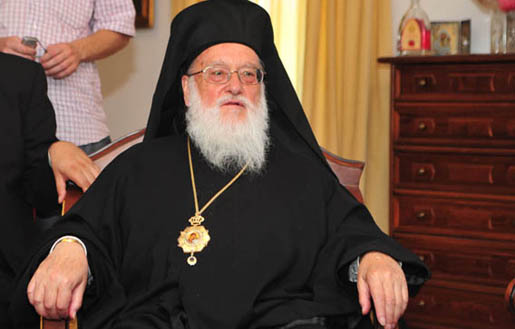I owe a great debt of gratitude to Metropolitan Kallistos—or at least to Timothy Ware. I read his book The Orthodox Church long ago and it was an important part of my conversion to Orthodoxy. I still have the somewhat battered volume on my bookshelf, a gold bishop’s mitre on the cover set off against a black background. That was before Timothy became Kallistos and parenthesized his surname, and I have followed his ecclesiastical promotion and the consequent name changes as he became a priest, then an archimandrite, and then a bishop, and then finally a metropolitan.
As well as following his upward path of ecclesiastical promotion, I have also followed what I consider to be his downward path away from Orthodox Tradition—or at least from his own formerly-held positions. With each subsequent revision of his classic The Orthodox Church, he seems to embrace progressively liberal views concerning the hot issues of the day, such as the possibility of the ordination of women to the priesthood. Of late he has written about homosexuality, publishing the Foreword for The Wheel, a publication whose stated purpose is “to articulate the Gospel intelligently and constructively for the 21st Century—a pluralistic era which presents Christianity with new and unique challenges, demanding a creative re-imagination of its social identity and role in public discourse”. Those familiar with such verbiage will recognize that its stated purpose is actually to de-construct the current Orthodox Tradition and offer what St. Paul would have called “another Gospel”.
 Like everything that His Eminence writes, his Foreword was eminently readable and thoughtful. I should say in advance that it would be unfair to characterize his stance as pro-gay. And much of what he says in the piece is quite good, such as his insistence that we give full weight to the Marriage Service as we articulate a theology of sexuality. I have, however, several concerns.
Like everything that His Eminence writes, his Foreword was eminently readable and thoughtful. I should say in advance that it would be unfair to characterize his stance as pro-gay. And much of what he says in the piece is quite good, such as his insistence that we give full weight to the Marriage Service as we articulate a theology of sexuality. I have, however, several concerns.
My first concern is that he has chosen to write a Foreword for The Wheel in the first place. Its professed neutral stance notwithstanding, those familiar with the publication know that its editorial and advisory board include people well-known for their aggressive and destructive homosexual agenda, and that it is anything but neutral or open-minded regarding the controversial sexual issues of the day. It is, in fact, simply an instrument for the advancement of a homosexual agenda within the Orthodox Church. The Metropolitan’s final words about The Wheel wherein he says that “its aim is to ‘initiate discussion’ and that “to ascertain the truth we must experiment” (quotes from two other authors) is naïve in the extreme. For the last 50 years or more the downward slide of the various churches into liberalism and apostasy has always taken place under the claim that the liberal de-constructors are simply “initiating discussion” and asking questions, and experimenting with new modes of thought. But the discussion always seems to result in the erosion of traditionally-held belief and praxis.
As a long-standing academic the Metropolitan cannot be unaware of this. The Wheel is simply offering more of the same. If a respected author writes for a publication whose known purpose is the promotion of a particular agenda, then by that very act he lends credence and credibility to that agenda. If I wrote a piece for a publication promoting, say, White Supremacy, I would not unnaturally be regarded as in some way sympathetic to that cause. It would matter little what I actually said in the piece, for anything short of total denunciation of White Supremacy would serve only to enhance it. I suspect that the Metropolitan, whose entire career has been as an academic in Oxford and a parish priest there, is unable to separate the lecture room from the world outside it.
In the world of Academia, all questions are allowed, and experimentation and the pushing of established boundaries are the norm. All questions are open questions, and no challenge is deemed out of court. Nothing is finally settled and everything in principle is open to revision. That is why the liberalism afflicting and destroying the Protestant churches always began in the seminaries. But although this is (and perhaps must be) the way of Academia, it has never been and cannot be the way of the Church. In the Church we receive truth not by experimentation but by revelation, and a number of matters are not in fact open to revision. For example, when certain things have been decided by ecumenical council and conciliar decree or when they are matters of universal and ancient consensus, these things are not open to revision. We may discuss them in that we may explain them to the questioning world and give the world the reasons why we believe them. But their truth is not subject to doubt. The Metropolitan writes as if he were always in his lecture hall, when in fact he is writing in the middle of a war zone. The truth is being challenged, and souls are being enticed, deceived, and lost. What one needs from a bishop now is not questions, but answers, not the murmur of a lecturer, but the blast of a trumpet. As a bishop, that is his job.
Secondly, it is true, as the Metropolitan says, that “personhood cannot be exactly defined…as human beings we are a mystery to ourselves”. This might give the impression that the teaching of the Scriptures also cannot be defined and that the teaching of the Scriptures is also a mystery. It is not so. Although the human person is a cloudy and complex mystery, the teaching of the Scriptures is crystal clear—unwelcome in many places, but still crystal clear. The complexity of human personhood is being used to obfuscate the issue. It is true that personhood must be understood in dynamic and not static terms. It is true that personhood is only fulfilled in relationship. It is also true that homosexual practice is unequivocally condemned in the Scriptures as sinful and that therefore Christians must renounce it along with other sinful lifestyles. It is not a matter, as the Metropolitan supposes, of the Church imposing or requiring this renunciation. “Are we right,” he asks plaintively, “to impose this heavy burden on the homosexual?” Yes; we are right to require it, because it is not us but God who imposes it upon the homosexual, just as He imposes the heavy burden of celibacy upon the single heterosexual. Does the single heterosexual “feel a vocation” for his or her celibacy? I suspect not, and I am unsure if the phrase has any real meaning. The single Christians that I know do not think in terms of vocation (whatever that means), but of obedience to Christ and the Scriptures. They are “called” to celibacy because they are called to obey.
Thirdly, the Metropolitan gives us the comparative examples of two homosexuals coming to confession. One homosexual is promiscuous and has engaged in multiple casual encounters, but is repentant and is therefore absolved and allowed to commune. This person falls into sin again and again, each time repenting and resolving to change, and each time being absolved and allowed to commune. The other homosexual is faithfully monogamous, but refuses to renounce the sexual aspect of his relationship, and so is not absolved or allowed to commune. This is deemed unjust and inconsistent: “The homosexual committed to a stable and loving relationship is treated more harshly than the homosexual who is casual and promiscuous”.
This is quite extraordinary. The whole issue of absolution and access to the Chalice revolves entirely upon the issue of whether or not the sinner is repentant and resolves to change. Their success in effecting change does not determine whether or not absolution is given—solely their sincere repentance and resolve. It is the same with a heterosexual with a porn addiction. If the person repents and resolves to refrain from using porn, he is absolved. Future failures do not mean that future absolution cannot be given, so long as the repentances are genuine and the resolve to change is sincere. Addiction is hard to break, and so patience and perseverance are required. It is quite different if the person addicted to porn tells the priest that he refuses to repent and refuses a resolve to avoid pornography. If that person said (in the words the Metropolitan places in the mouth of the faithfully monogamous homosexual), “I am not yet ready to undertake that”—whether the “that” is an avoidance of pornography or homosexual practice—then of course no absolution or communion are possible. There is no injustice or harsh treatment in either case. If the faithfully monogamous homosexual said, “Yes, I will try to remain celibate” he would be absolved time and again, as long as his continual attempts at celibacy were sincere. (Obviously a sensible strategy for celibacy would also involve not living in close quarters with someone to whom one was strongly attracted, regardless of the gender. But that is a matter for another time.)
Fourthly, the Metropolitan wonders, “Why do we put so great an emphasis upon genital sex?” The question is an astonishing one, all the more so since it is those promoting a homosexual agenda which place the emphasis on genital sex. One asks the homosexual in return, “If genital sex is not important, why do you insist upon it? Why do you insist on not just living with person of the same gender, but also having sex with him?” The whole screaming insistence upon gay marriage in our culture is predicated precisely on the importance of genital sex.
And one can have some sympathy for this view of the importance of sex. For it is not just the contemporary Church which places so great an emphasis upon genital sex, but St. Paul. Paul differentiates between sexual sins and other sins (such as theft for example). In 1 Corinthians 6:18 he writes, “Flee fornication [Greek porneia]. Every sin that a man commits is outside the body, but the fornicator sins against his own body”. In other words, it is because we are sexual beings that sexual sins involve the totality of our personhood in a way that other sins do not. There can be casual theft, but there can be no such thing as casual sex—as many have found to their cost. Regardless of what media propaganda says, sexual sin affects us more profoundly than any other. This is not a matter (as the Metropolitan suggests) of “enquiring what adult persons are doing in the privacy of their bedrooms” or of “gazing through the keyhole”. One is not gazing through the keyhole, but at the Scriptures. Besides, the very image of one gazing through a keyhole is absurd and unworthy; in confession the issue is precisely “what adult persons are doing in the privacy of their bedrooms”. And a theology which undergirds and supports sacramental confession must be similarly concerned as well. For how else can we tell our people of what they should repent and avoid?
One appreciates that the Metropolitan does not shy away from such a contentious issue as homosexuality. It is, as he says, quoting Fr. John Behr, “perhaps the defining question of our era”. More than that, it is the frontline in the World’s perennial war against the Church. In this war, one needs trumpets, and clarity, and compassionate, confident answers. One wishes that in this battle the Metropolitan had not given such an indistinct sound.
Note: An insightful look at the wider issue of homosexuality is provided by Hieromonk Herman on the Orthodoxy and Heterodoxy site, accessed here.

















